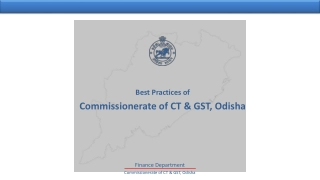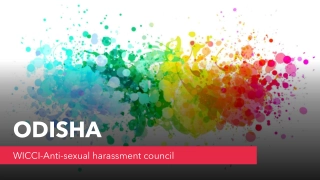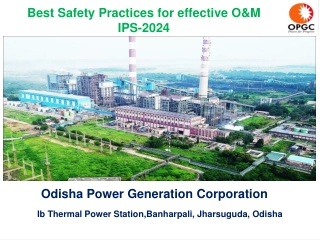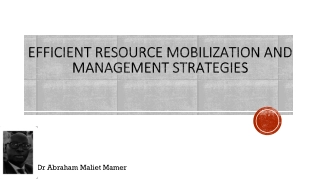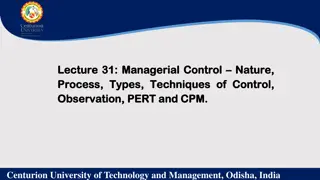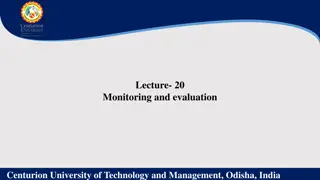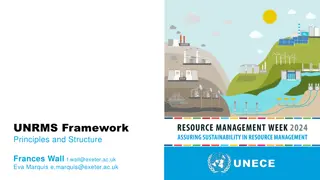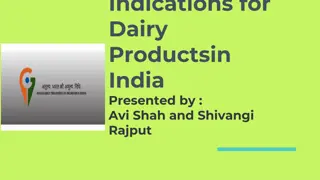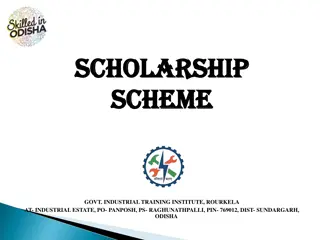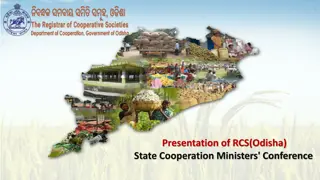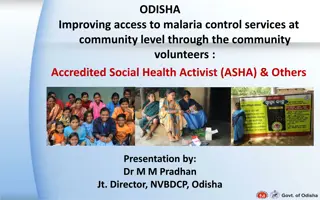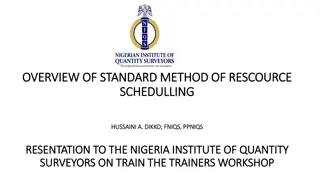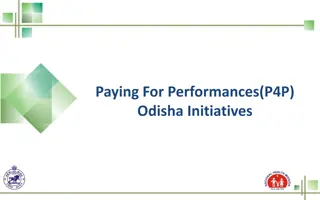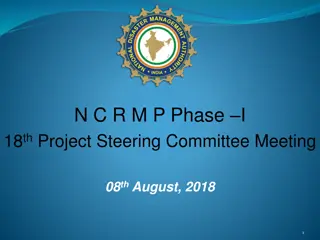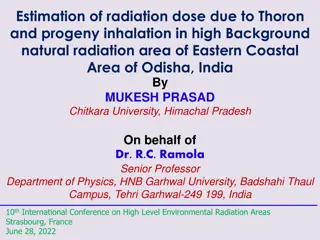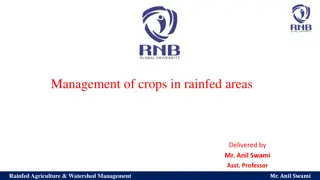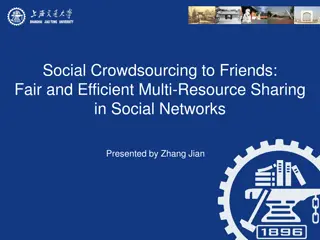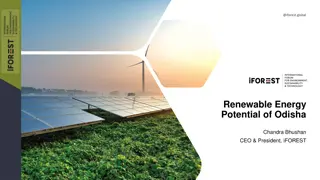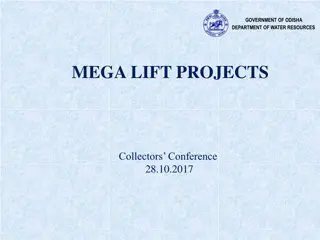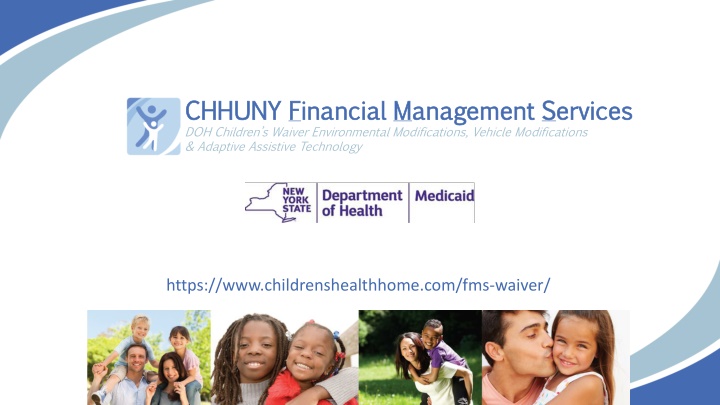
Efficient Resource Management Strategies in Odisha State
Utilize strategies for resource management to improve input efficiency in Odisha State. Explore land use patterns, cultivated land inventory, soil fertility, nutrient status, soil testing, and measures to utilize fallow lands effectively.
Download Presentation

Please find below an Image/Link to download the presentation.
The content on the website is provided AS IS for your information and personal use only. It may not be sold, licensed, or shared on other websites without obtaining consent from the author. If you encounter any issues during the download, it is possible that the publisher has removed the file from their server.
You are allowed to download the files provided on this website for personal or commercial use, subject to the condition that they are used lawfully. All files are the property of their respective owners.
The content on the website is provided AS IS for your information and personal use only. It may not be sold, licensed, or shared on other websites without obtaining consent from the author.
E N D
Presentation Transcript
CHHUNY CHHUNY F Financial DOH Children s Waiver Environmental Modifications, Vehicle Modifications & Adaptive Assistive Technology inancial M Management anagement S Services ervices https://www.childrenshealthhome.com/fms-waiver/
Purpose Review expectations for: Care Managers (CMs) FMS Waiver Coordinator (FMS WC) Review upcoming changes: Letter of Medical Necessity (LOMN)/Physicians Order (PO) Due Diligence Statement 2
Currently Number of active projects with FMS: over 400! Projects are moving along at a much faster rate than previously! Communications are significantly improved. FMS continues to work on growing our evaluator and vendor network. 3
Expectations for Care Managers (CMs)
Intent Request Phase Provide detailed information on medical diagnoses related to the project request and what is being requested. Be as specific as possible regarding the project request. Ex) Ramp . Where is the ramp going to be placed? Does the family have concerns about ramp placement? Are they seeking a permanent or portable ramp? FMS reviews intents for the following: Medical Necessity If the item could potentially be DME Appropriateness (does it meet the medical need of the member and is it allowable under the waiver) 5
Intent Request Phase Questions do not mean that the FMS is denying the intent or indicating the intent is not appropriate. The FMS has to obtain a clear picture of the request to determine if it is appropriate for the waiver. CMs are expected to gather the requested information and share with the FMS, so the FMS can complete the intent request review. 6
Intent Request Phase Some project requests may require further review from Department of Health (DOH). The FMS will notify you if a request has been referred to DOH for review. If the Care Manager (CM) does not reply to the FMS regarding the intent, or the request is not moving towards evaluation/closure within 60 days of submission to the FMS, you will receive a letter from the FMS stating that the intent will be closed within 30 days if not response/action is taken. Intent requests should not be submitted until the family is ready to pursue the project. 7
Intent Request Phase Medicaid is the payor of last resort. CMs should have already confirmed that a project or item is not covered by third party health insurance (if applicable) and exhausted all possible funding sources before pursuing a project with FMS. CMs should be setting realistic expectations with families regarding what requests are appropriate for the waiver and providing them with the parent info sheet. Ex. Total remodels or remodel of new builds are not appropriate, homes should be modification ready and meet NYS building code. 8
Pre-Project Phase Once a Pre-Project Evaluation (PPE) Support Letter is sent by the FMS, the CM should communicate with the evaluator to schedule the evaluation. No evaluations should be scheduled until you have received approval from the FMS. Approval letters will only be sent to the CM, not the CM Supervisor. CMs should not be asking the evaluator to look at additional projects beyond what is approved in the letter for this project. CMS should submit all required evaluation documentation and invoices timely so the FMS can ensure evaluators are paid quickly. for their work. 9
Pre-Project Phase The FMS will discuss the results of the evaluation with the evaluator and clarify any concerns. If project can proceed: The FMS will notify CM that the case conference is required. The FMS will now use Doodle for scheduling all case conferences. Process: The FMS will notify CM via the FMS form that the project is ready to proceed to the pre-project case conference. 10
Pre-Project Phase The FMS will include in this update, a link to Doodle. Doodle link will show the FMS availability for a case conference. CM should coordinate with the family and determine the best date for a case conference based on FMS availability. If the evaluator is the project manager, they should also be on the call. This link will include several dates/times for availability and will be sent to other CMs who need to schedule the case conference for their project. Be sure to check back to confirm if the time/date is still available frequently. 11
Pre-Project Phase Family should be notified of several scheduling options in case a previously open spot is taken. Once CM chooses an open meeting date/time, it will automatically populate on the FMS schedule. CM will receive confirmation that the meeting is scheduled via an email from Doodle. Please do not email FMS@ inbox to confirm if the meeting has been scheduled. 12
Pre-Project Phase Doodle link should be used only for case conferences (PPE and Service Request). CM will be required to identify the project # and member name when scheduling with Doodle so the FMS can confirm the meeting is for the case conference process. Any meetings scheduled via Doodle that are not related to a project at the case conference stage will be automatically canceled by the FMS. 13
Pre-Project Phase Case Conference cont d: This is the opportunity for the family to speak with the FMS about the pending project and evaluation. Prior to the conference, the family should not be contacting the FMS to discuss the evaluation findings. These communications should be filtered through the CM. 14
Pre-Project Phase If the project cannot proceed: FMS will notify CM and family by providing the Notice of Decision (NOD) if required. The NOD provides the family the opportunity to file for a fair hearing if they do not agree with the decision. CMs should not be referring families to the FMS to discuss why a project was denied. The CM is responsible for discussing the NOD with the family and assisting with next steps (ex. pursuing alternative course of action, filing for Fair Rights Hearing, etc). 15
Project Management Some evaluators may choose to act as project manager. Project managers can assist with obtaining bids, coordinating with chosen vendors, monitoring project progress, and post-evaluations (if required). Project management may not be necessary for all projects depending on complexity. Not all evaluators offer project management at this time. 16
Service Request Phase The FMS has checklists on our website to assist with the service request packet (SRP) development and submission. Please check the guidance documents on the website before calling to request next step guidance. If there is a project manager involved in the process, they can assist with the bid process. Contacts with vendors, insurance, providers, and the family during this phase are the responsibility of the CM. The FMS is not responsible for contacting third party health insurance to obtain an exclusion letter or explanation of benefits. 17
Service Request Phase Packet Submission: The FMS will review for completeness. Incomplete packets will not be accepted. Issues with bids will be referred to the CM to coordinate with the vendor for correction. Ex: Bids should align with the scope identified on the evaluation. Complete packets will be reviewed by the FMS to proceed to bid selection. 2nd case conference is a critical touchpoint for the family, CM, and the FMS to discuss the work that is about to commence! 18
Project in Progress Notify the FMS if you have any concerns: Ex: Vendor was paid deposit several months ago, but no work has commenced. Ex: Vendor does not appear to be following the scope. Ex: Any changes in circumstances or CM changes. Final Cost Form and final invoice should be submitted timely. Post-evaluation (if required) should be attended by CM unless virtual VMOD post-eval. 19
FMS Roles/Responsibilities Review Process Coordinate Oversee Review documentation provided by CMs: Process invoices for evaluators and vendors. Coordinate contracting with vendors/evaluators. Oversee process from initial request to project completion (if project reaches this phase). Evaluations SRPs Invoices 21
FMS Roles/Responsibilities Notify CM when: Request can proceed to evaluation Next steps following receipt of evaluation Availability for case conferences When revisions are needed The project bid is selected Need for Final Cost Form, post-evaluation. The FMS is not a trainer for health home policy. Questions that are not directly related to a project (ex. formatting Health Home (HH) Plan of Care (POC) need to be referred to your lead HH) 22
Communications The FMS strives to respond within the following timeframes: Intent Requests: 3 business days of receipt by FMS. Evaluations: 5 business days of receipt by FMS. SRPs: 5 business days of receipt by FMS. General communications: 5 business days of receipt by FMS. Families should not be cc ed into emails with the FMS. Please do not call or email to request a reply if the 5 business days have not passed since your initial communication with the FMS. This makes it much more difficult to respond to your initial request! Use fms@childrenshealthhome.org email, not a direct staff email. 23
Communications Service Request Packets: Upload all documents at once and update the form once all documents are uploaded. Updating the FMS form each time a document is uploaded makes it difficult to track in the FMS inbox. Upload the SRP documents as one packet. Most communications from the FMS will go through the FMS form, and you will receive an email when this has been updated. Check your email prior to calling! You may have an update from the FMS that you have not seen yet. 24
Communications The FMS and CM are collaborating on project completion. Projects are moving faster, but still take time. CM push back on waiver requirements, non-collaboration, or inappropriate communications are reviewed by management. HCBS Waiver Supervisor will follow up with lead HHs if communication concerns persist. This process is intended to be positive, supportive, and pursued to support the needs of the member/family. We all share the same goal: help members live safely and independently! 25
Changes to Intent Request November 1st, 2024 Beginning on 11/1/24, intent requests will now require the following to be submitted with the intent to support the need to move to evaluation/next steps: Letter of Medical Necessity (LOMN) for EMODs/VMODs Clinical Justification for AAT Due Diligence Statement for EMOD/VMOD/AAT Moving forward, the physician s order/script is not needed in addition to an LOMN as it is duplicative. The LOMN must be signed by an MD. Historically, this information was not requested until the pre-project evaluation phase. Why the change? 27
Changes to Intent Request FMS has identified several trends: Projects are being requested without a clear tie to medical necessity or confirming other funding sources were pursued first. Confusion over LOMN and Physician s Order/script. Requests are approved to move to evaluation, and the LOMN supplied at evaluation does not always align with what was requested which can cause delays or issues later on. Due Diligence Statements do not identify that all possible funding sources are being explored before pursuing the project under the waiver. 28
Changes to Intent Request Having the LOMN at the intent phase helps the FMS determine if a project is appropriate and would address the needs of the child/youth. Some project requests are not medically necessary, even though the family may prefer them or family requests an item that would be helpful to have (i.e. recreational purpose). Save time and effort on the part of the CM, the family, and the FMS. 29
Changes to Intent Request The FMS can confirm, prior to any waiver funding being used for a project, the CM has exhausted all possible funding sources. If the Due Diligence Statement provided at intent does not identify that multiple sources were explored or does not clarify why more funding sources could not be explored, the FMS can request more information. The exclusion letter from the third-party health insurance is not expected at this point but acknowledgment that it will be pursued should be documented. Elements of medical necessity and due diligence should be explored prior to submitting the intent request to FMS. 30
Upcoming Changes/Initiatives Updated checklists: Available on the CHHUNY Portal. Support Inbox: supportfms@childrenshealthhome.org. For policy/workflow/training questions ONLY. No PHI should be submitted through this inbox or comments/questions related to specific projects. Emails that include PHI or are tied to a specific project that are sent to this inbox will be deleted. 31
Upcoming Changes/Initiatives Intent Closure Letter: For all intents still pending 60 days after submission to the FMS that require additional follow up from the Care Manager and the FMS requests have not been responded to, the Care Manager will receive the closure letter that communicates the intent will be closed in 30 days if no further action is taken. 32
Questions? Projects: fms@childrenshealthome.org Policy/Workflow/Training: supportfms@childrenshealthhome.org HCBS: jmcelligott@childrenshealthhome.org CHHUNY: nbryl@childrenshealthhome.org 33

